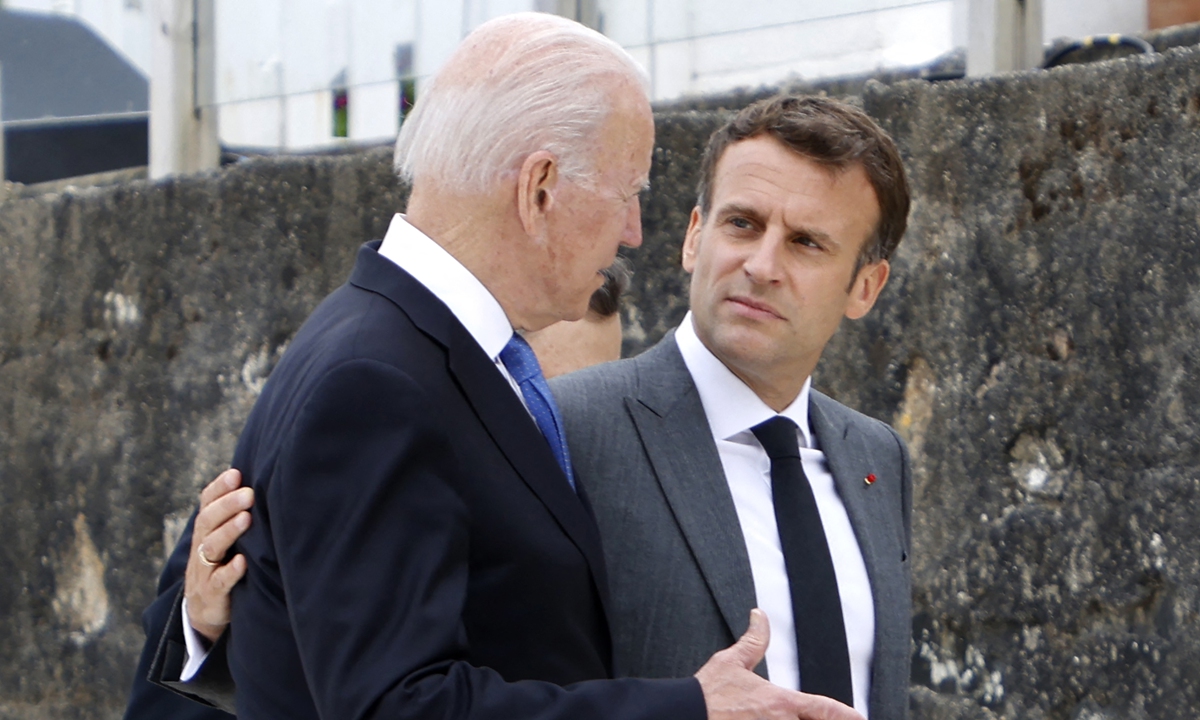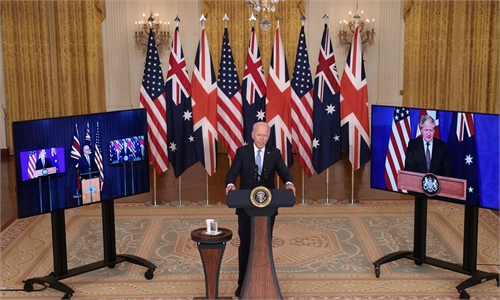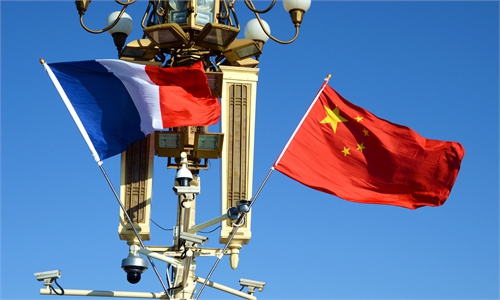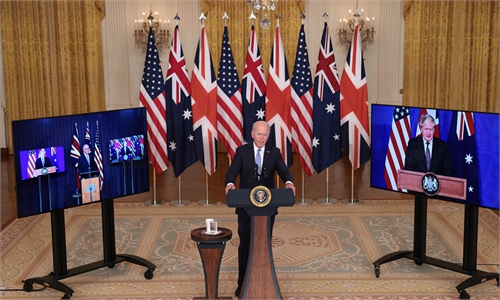
US President Joe Biden (left) and France's President Emmanuel Macron speak at the start of the G7 summit in Carbis Bay, Cornwall on June 11, 2021. Photo: AFP
AUKUS, a new military bloc comprised of the US, the UK and Australia, has deepened the estrangement between Washington and Brussels. And with Washington and Paris too, despite that US President Joe Biden admitted the US actions "clumsy" in its submarine deal with Australia. After being "stabbed in the back" by the US, France is reassessing its own Indo-Pacific strategy. According to media reports, Paris is considering deepening ties with Tokyo and New Delhi.France is an important ally and supporter of US' Indo-Pacific strategy. The "French outrage" certainly casts a shadow over the Biden administration's plans to weave a mini-network of multilateralism in the Indo-Pacific to contain China. But it is worth noting that the US policy in the Indo-Pacific region will not be thwarted by the whim of France.
The strategies of the US and France regarding the Indo-Pacific region has structural contradictions. They also considerably overlap in interests, strategic objectives and specific plans. Both seek frontline military deployment in the region and to expand network of allies and partnerships to contain China.
The presence of Paris in the region, meanwhile, has remained within the strategic framework of Washington. Yet both Tokyo and New Delhi are the main pivot points of US strategy in the region. They, too, are important partners of France's security strategy to extend to the region. In fact, Tokyo and Paris have inked a bilateral agreement to share defense and other supplies to deepen security cooperation. Moreover, in 2018, Paris and New Delhi signed the Logistic Support agreement for the provision of reciprocal logistics support.
In this light, France's defense and security cooperation with both Japan and India has a deep foundation. To some extent, such cooperation is also part of the US strategic deployment in the Indo-Pacific region.
The crisis between France, Australia and the US over the submarine procurement agreement can hardly impact the strategic deployment of the US in the Indo-Pacific region. But the Biden administration's Indo-Pacific strategy will inevitably be compromised due to internal contradictions.
The US has united Japan, India, Australia, the UK and France to adopt a common policy and maintain close cooperation on military deployments and diplomatic operations. One of the main reasons is the common understanding of the "China threat." However, all of them have different answers to questions such as what the China threat is, how to deal with it and what their goals are. Therefore, they have different calculations regarding China.
To be more specific, in the eyes of Tokyo policymakers, Beijing is threatening its demands of rights and security interests in the East China Sea. As for New Delhi, apart from the border disputes with Beijing, it is wary of the possibility that China will challenge its hegemony in the Indian Ocean. Both London and Paris regard the Indo-Pacific region as an important location to expand their power and demonstrate their fantasies for global influence.
Nevertheless, US' Indo-Pacific strategy aims to maintain Washington's dominance of regional order. Essentially, the US is taking advantage of the support of many allies and partners to advance its own interests. It has adopted a policy that sacrifices benefits from economic and trade cooperation and takes risks for war. However, this actually works against the foreign economic and security strategies of countries like Japan, France and the UK.
In this sense, Paris's recent tantrum against Washington cannot stop the latter's deployment in the Indo-Pacific region. Since US' Indo-Pacific strategy relies on the support of its allies and partners, Washington will always suffer from irreconcilable conflicts within the Western system. Japan, the UK, France, Australia, India and countries around the South China Sea will form a "cooperation + conflict" relationship with the US in the Indo-Pacific region - on the one hand, they cooperate with Washington's strategic deployments, especially in the security field; on the other, due to the conflicts of interests and demands, they will try to offset and not stay in every step with Washington's strategies.
In other words, Washington's wish to form a unified front with a common policy in the Indo-Pacific region will certainly face major setbacks and even failure.
The author is director of the World Navy Research Center at the National Institute for South China Sea Studies. opinion@globaltimes.com.cn



